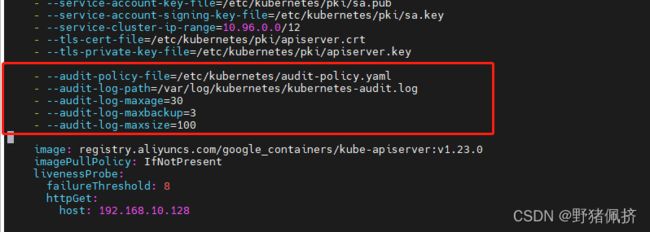- rockylinux9.4单master节点k8s1.28集群部署
大白菜和MySQL
k8s集群kubernetes容器云原生
kubernetes集群部署常见的k8s部署方式包括:二进制包、kubeadm工具、云服务提供商、或通过一些开源的工具搭建,例如:sealos、kuboard、Runcher、kubeSphere。本文使用kubeadm的部署方式,部署k8s1.28版本我本地安装资源规划如下:IP地址主机名称角色操作系统主机配置参考192.168.3.92master1masterrockylinux9.4(最小
- 华为云云原生王者之路集训营(黄金-第五章)
※网络笨猪※
云厂商-公有云华为云云原生
华为云云原生王者之路集训营(黄金-第五章)1.11.1Kubernetes工作负载(Workload)介绍工作负载是在Kubernetes上运行的应用程序。无论你的负载是单一组件还是由多个一同工作的组件构成,在Kubernetes中你可以在一组Pods中运行它。在Kubernetes中,Pod代表的是集群上处于运行状态的一组容器。四种负载:无状态工作负载:管理的Pod集合是相互等价的,需要的时候可
- k8s pod分类、核心组件、网络模型、kubectl常用命令
2501_90243308
kubernetes网络容器
假如有2个pod,pod有其生命周期,万一pod所在的节点宕机了,那么此pod将应该要在其他的节点上重建,而重建完的pod与原来的pod已经不是同一个pod了,只是两者都是运行的同一个服务而已。且每个容器都有其IP地址,重建的pod中的容器其P地址与之前的pod中容器的IP地址是不一样的,如此一来就会存在一个问题,客户端如何访问这些pod中的容器呢?措施:服务发现:就比如集贸市场的注册摊位和声明地
- redis清空缓存
奔跑吧邓邓子
高效运维缓存redis数据库
提示:“奔跑吧邓邓子”的高效运维专栏聚焦于各类运维场景中的实际操作与问题解决。内容涵盖服务器硬件(如IBMSystem3650M5)、云服务平台(如腾讯云、华为云)、服务器软件(如Nginx、Apache、GitLab、Redis、Elasticsearch、Kubernetes、Docker等)、开发工具(如Git、HBuilder)以及网络安全(如挖矿病毒排查、SSL证书配置)等多个方面。无论
- Helm Chart 实现 Kubernetes 应用多环境部署实战
ivwdcwso
运维kubernetes容器Helmk8s云原生
在现代软件开发中,通常需要将应用部署到多个环境(如开发环境、测试环境、生产环境)。每个环境的配置可能不同,例如数据库连接、资源限制、镜像版本等。HelmChart提供了强大的模板化和参数化功能,可以轻松实现多环境部署。本文将详细介绍如何使用HelmChart实现Kubernetes应用的多环境配置,并通过实战演示完整的部署流程。©ivwdcwso(ID:u012172506)1.多环境部署的需求在
- DigitalOcean Kubernetes现已支持VPC natvie集群
DO_Community
kubernetes
DigitalOceanKubernetes(DOKS)的VPCnatvie集群功能现已正式上线!这一新功能实现了DOKS集群与虚拟私有云(VPC)资源之间的无缝集成,提升了工作负载的网络灵活性和可扩展性。什么是VPCnatvie集群?VPCnatvie集群支持Kubernetes集群与VPC资源之间进行原生路由。这意味着你的DOKS集群可以作为现有VPC网络架构的自然扩展,提供更流畅的连接和更好
- 利用Kubespray安装生产环境的k8s集群-排错篇
超级阿飞
k8sclusterkubernetesdocker容器
利用Kubespray安装生产环境的k8s集群-排错Ansible排错Ansible安装后需要加入到PATH,以便能够直接运行。一般用非root用户运行,注意在playbook或者inventory里要显性定义become属性。最好采用ansible运行账号可以免密码sudo的模式。Ansible的配置文件,在kuberspray安装时已经存在,需要将Ansible运行配置文件指向相应位置。配置文
- k8s namespace绑定节点
mumu2lili
k8s云计算kubernetesjava容器
k8snamespace绑定节点1.apiserver启用准入控制PodNodeSelector2.namespace添加注解scheduler.alpha.kubernetes.io/node-selector3.labelnode1.apiserver启用准入控制PodNodeSelectorvim/etc/kubernetes/manifests/kube-apiserver.yamlspe
- Docker多架构镜像构建踩坑记
一直学下去
docker容器adm64arm64多架构
背景公司为了做信创项目的亮点,需要将现有的一套在X86上运行的应用系统迁移到ARM服务器上运行,整个项目通过后端Java,前端VUEJS开发通过CICD做成Docker镜像在K8S里面运行。但是当前的CICD产品不支持ARM的镜像构建,于是只能手工构建ARM镜像。以下是一些踩坑的记录,希望能帮大家少踩坑构建环境本地电脑DeepinLinux23(Windows的WSL和其他的Linux系统都可以)
- 《Go底层原理与工程化实践》发布啦!
go后端
为什么要深入学习Go语言 Go语言是目前的主流语言之一,具有入门快、高性能、开发效率高等特点,目前越来越多的互联网企业都在使用Go语言。另外,原生体系中的Kubernetes、Docker等开源项目就是基于Go语言开发的,想要深入研究云原生技术,就必须精通Go语言。最后,只有对Go语言底层有一定了解,才能开发出高性能、高可用的Go服务,并在解决线上问题、性能调优时游刃有余。本书特色掌握Go高并发
- 如何部署 Flask 应用程序到生产环境?
Channing Lewis
Pythonflaskpython后端
在生产环境中部署Flask应用程序需要考虑稳定性、安全性、可扩展性和性能。以下是Flask应用的常见生产部署方法及最佳实践:1.选择部署方式常见的Flask生产环境部署方式包括:部署方式适用场景说明Gunicorn+Nginx适合中小型项目轻量级,性能稳定uWSGI+Nginx高性能并发、生产环境推荐生产级别,支持异步工作Docker+Kubernetes容器化部署,微服务架构适合大规模微服务集群
- Kubernetes入门
I~Lucky
kubernetes容器云原生
什么是Kubernetes?Kubernetes(简称K8s)是一个开源的容器编排平台,主要用于自动化应用的部署、扩展和管理。它可以帮助开发者和运维人员管理容器化的应用,使得服务能够在不同的主机之间进行调度,从而实现负载均衡、高可用和自动伸缩。Kubernetes的工作原理Kubernetes通过将应用打包到容器中,并在集群中运行这些容器来实现应用的部署和管理。容器是轻量级的、可移植的、自包含的软
- Kubernetes网络
qichengzong_right
linuxkubernetes云原生linux云原生kubernetes
Kubernetes网络Kubernetes网络模型相关概念链接Kubernetes网络模型Kubernetes网络模型由多个关键部分构建而成:在Kubernetes集群中,每个Pod都会被分配一个独一无二的、在集群范围内有效的IP地址。Pod拥有自己独立的私有网络命名空间,该命名空间由Pod内的所有容器共享。这意味着,在同一Pod中运行的不同容器进程能够通过localhost进行便捷的相互通信。
- 在KubeFATE中定制化部署联邦学习组件的深入分析
亨利笔记
dockerkubernetes数据库java大数据
题图摄于国家大剧院(本文作者系VMware中国研发云原生实验室架构师,联邦学习开源项目KubeFATE/FATE-Operator维护者。)需要加入KubeFATE开源项目讨论群的同学,请关注亨利笔记公众号后回复“kubefate”即可。相关文章在JuypterNotebook中构建联邦学习任务云原生联邦学习平台KubeFATE原理详解用KubeFATE在K8s上部署联邦学习FATEv1.5使用D
- kubectl命令
minyao922
kubernetesdocker容器
kubernetes基本概念Pod:k8s最小部署单元,一组容器的集合Deployment:最常见的控制器,用于更高级别部署和管理PodService:为一组Pod提供负载均衡,对外提供统一访问入口Label:标签,附加到某个资源上,用于关联对象、查询和筛选Namespaces∶命名空间。将对象逻辑上隔离,也利于权限控制edit(编辑资源)//运行一个pod类型的nginx,名字叫nginx,定义
- Kubectl常用命令操作
_Eden_
linux运维服务器
kubectl命令格式:kubectlcommandtypenamecommand:表示子命令,用于操作kubernetes的集群资源对象,如:createdeletedescribegetapplytype:资源对象的类型name:资源对象的名称1.创建资源对象kubectlcreate-fmy-service.yaml表示根据yaml配置文件创建service2.查看资源对象kubectlge
- k8s 安装nfs_k8s共享存储之nfs
weixin_39941732
k8s安装nfs
特别说明:测试使用,不建议生产环境1、在master节点配置(node1)1)yum安装nfs#yum-yinstallnfs-utilsNFS的关键工具包括:主要配置文件:/etc/exports;NFS文件系统维护命令:/usr/bin/exportfs;共享资源的日志文件:/var/lib/nfs/*tab;客户端查询共享资源命令:/usr/sbin/showmount;端口配置:/etc/
- k8s中使用MySQL共享存储_k8s使用NFS做动态存储做mysql容器主从同步
罗-Moline
k8s中使用MySQL共享存储
k8s里面存储一直是比较难搞得,之前做的静态存储,写这篇文档记录一下动态存储创建的过程。使用动态存储的好处是开发者可以更关注自己的开发环境,不用关心后端的资源,还有就是更换存储类型不用做大的改变,只需切换一下storageclassName即可。根据这篇博客来的!谢谢博主!!!https://www.cnblogs.com/00986014w/p/9406962.html我把大致上思路分成三步:1
- 在K8S中,如何使用EFK实现日志的统一管理?
Dusk_橙子
K8Skubernetes容器云原生
在Kubernetes中,EFK是一种常见的日志统一管理方案。EFK堆栈允许你收集、存储、搜素、分析和可视化容器应用程序的日志。下面是如何在Kubernetes中使用EFK实现日志统一管理的详细步骤:部署Elasticsearchelasticsearch是一个分布式、RESTful风格的搜索和分析引擎,能够解决越来越多用例的查询语言,它通常用于日志和事件数据分析。首先,你需要再kubernete
- 配置管理工具和k8s功能重叠部分的优势比较
大囚长
容器技术运维人生容器云原生运维kubernetes
通过自动化配置管理工具(如Ansible、Puppet、Chef)和应用内管理机制,也可以实现自动部署、扩缩容、负载均衡和故障恢复等功能。Kubernetes(K8s)在这些方面具有哪些独特的优势呢,尤其是在云原生环境和大规模分布式系统中。以下是对比分析:1.自动化配置管理工具的局限性自动化配置管理工具(如Ansible、Puppet、Chef)主要用于基础设施的配置管理和应用部署,但它们在某些方
- 在K8S中,如果后端NFS存储的IP发送变化如何解决?
Dusk_橙子
K8Skubernetestcp/ip容器
在Kubernetes中,如果后端NFS存储的IP地址发生了变化,您需要更新与之相关的PeristentVolume(PV)或PersistentVolumeClaim(PVC)以及StorageClass中关于NFS服务器IP的配置信息,确保K8S集群内的Pod能够正确连接到新的NFS存储位置。解决方案如下:更新PersistentVolume(PV):如果你直接在PV中指定了NFS服务器的IP
- K8S中ingress详解
元气满满的热码式
kubernetes容器云原生
Ingress介绍Kubernetes集群中,服务(Service)是一种抽象,它定义了一种访问Pod的方式,无论这些Pod如何变化,服务都保持不变。服务可以被映射到一个静态的IP地址(ClusterIP)、一个NodePort(在集群的每个节点上的特定端口)、一个LoadBalancer(通过云服务提供商的负载均衡器)或一个外部IP。Service的两种服务暴露方式,NodePort和LoadB
- 【云原生技术】k8s是不是不能处理0.1core的CUP配置,必须配置成100mi?
阿寻寻
云原生kubernetes容器
CPU的资源请求和限制特定的表示方式CPU配置的单位配置要求示例在Kubernetes中,CPU的资源请求和限制确实有特定的表示方式。关于你提到的0.1core和100m这两个值,以下是详细的解释:CPU配置的单位KubernetesCPU单位:Kubernetes使用milliCPU(毫核)作为CPU的计量单位。1核CPU=1000milliCPU(m)。例如,0.1核实际上表示为100m(10
- 【云原生技术】K8S更新策略有哪些方式,每种方式的可选必填字段有哪些,详细举例说明
阿寻寻
云原生kubernetes容器
更新策略有哪些方式一、更新策略详细举例1.**RollingUpdate(滚动更新)**说明:必填字段:可选字段:示例:2.**Recreate(重建)**说明:必填字段:可选字段:示例:3.**OnDelete(手动更新)**说明:必填字段:可选字段:示例:总结详细示例小结二、Recreate不可选minReadySeconds吗?Recreate更新策略与minReadySeconds示例总结
- CentOS8下安装wget、wget2
奔跑吧邓邓子
高效运维linuxcentoswgetwget2
提示:“奔跑吧邓邓子”的高效运维专栏聚焦于各类运维场景中的实际操作与问题解决。内容涵盖服务器硬件(如IBMSystem3650M5)、云服务平台(如腾讯云、华为云)、服务器软件(如Nginx、Apache、GitLab、Redis、Elasticsearch、Kubernetes、Docker等)、开发工具(如Git、HBuilder)以及网络安全(如挖矿病毒排查、SSL证书配置)等多个方面。无论
- K8s架构与组件
稚辉君.MCA_P8_Java
kubernetes容器云原生网络
一、K8s架构在Master通常上包括kube-apiserver、etcd存储、kube-controller-manager、cloud-controller-manager、kube-scheduler和用于K8s服务的DNS服务器(插件)。这些对集群做出全局决策(比如调度),以及检测和响应集群事件的组件集合也称为控制平面。其实K8s官方并没有Master这一说,只是大多数安装工具(kube
- prometheus监控k8s的metric详解-01(apiserver部分)
玄德公笔记
#常用服务-Prometheus监控prometheuskubernetesmetrick8s监控apiserver容器
文章目录1.apiserveradmission(准入)和audit(审计)1.1准入控制器调用次数1.1.1`apiserver_admission_controller_admission_duration_seconds_count`1.1.2`apiserver_admission_controller_admission_duration_seconds_bucket`1.1.3`api
- Docker 和 Kubernetes
小馋喵知识杂货铺
性能dockerkubernetes容器
Docker和Kubernetes(K8s)是当前最流行的容器化技术,用于开发、部署和管理应用程序。它们通常一起使用,提供从开发到生产的完整生命周期管理,特别是在微服务架构和云原生应用的开发中。1.Docker简介Docker是一个开源的容器化平台,它可以将应用及其所有依赖项打包在一个统一的容器中,从而简化了软件的开发、部署、运行和管理。容器化应用具有跨平台、一致性强、启动速度快等特点。容器:一个
- Kubeadm自动化部署kubernetes 1.29.1
爱喝荔枝味嘉宾
自动化kubernetesdocker
基础环境配置服务器:centos7.720191、规划网络环境:192.168.7.20k8s-master.linux.com2U4G192.168.7.21k8s-node01.linux.com2U8G192.168.7.22k8s-node02.linux.com2U8G!!!!注意以下步骤三个机器都需要执行2、配置master与node的主机名解析┌─[k8s-master]─[~]└─
- 《Kubernetes部署篇:基于麒麟V10+ARM64架构部署harbor v2.4.0镜像仓库》
东城绝神
《Linux运维实战总结》arm64harbor
总结:整理不易,如果对你有帮助,可否点赞关注一下?更多详细内容请参考:企业级K8s集群运维实战一、环境信息K8S版本操作系统CPU架构服务版本1.26.15KylinLinuxAdvancedServerV10ARM64harborv2.4.0二、部署操作2.1、资源包下载说明:如果你从别处找来的镜像,redis提示报错ignore-warningsARM64-COW-BUG,可以重新编译redi
- Linux的Initrd机制
被触发
linux
Linux 的 initrd 技术是一个非常普遍使用的机制,linux2.6 内核的 initrd 的文件格式由原来的文件系统镜像文件转变成了 cpio 格式,变化不仅反映在文件格式上, linux 内核对这两种格式的 initrd 的处理有着截然的不同。本文首先介绍了什么是 initrd 技术,然后分别介绍了 Linux2.4 内核和 2.6 内核的 initrd 的处理流程。最后通过对 Lin
- maven本地仓库路径修改
bitcarter
maven
默认maven本地仓库路径:C:\Users\Administrator\.m2
修改maven本地仓库路径方法:
1.打开E:\maven\apache-maven-2.2.1\conf\settings.xml
2.找到
- XSD和XML中的命名空间
darrenzhu
xmlxsdschemanamespace命名空间
http://www.360doc.com/content/12/0418/10/9437165_204585479.shtml
http://blog.csdn.net/wanghuan203/article/details/9203621
http://blog.csdn.net/wanghuan203/article/details/9204337
http://www.cn
- Java 求素数运算
周凡杨
java算法素数
网络上对求素数之解数不胜数,我在此总结归纳一下,同时对一些编码,加以改进,效率有成倍热提高。
第一种:
原理: 6N(+-)1法 任何一个自然数,总可以表示成为如下的形式之一: 6N,6N+1,6N+2,6N+3,6N+4,6N+5 (N=0,1,2,…)
- java 单例模式
g21121
java
想必单例模式大家都不会陌生,有如下两种方式来实现单例模式:
class Singleton {
private static Singleton instance=new Singleton();
private Singleton(){}
static Singleton getInstance() {
return instance;
}
- Linux下Mysql源码安装
510888780
mysql
1.假设已经有mysql-5.6.23-linux-glibc2.5-x86_64.tar.gz
(1)创建mysql的安装目录及数据库存放目录
解压缩下载的源码包,目录结构,特殊指定的目录除外:
- 32位和64位操作系统
墙头上一根草
32位和64位操作系统
32位和64位操作系统是指:CPU一次处理数据的能力是32位还是64位。现在市场上的CPU一般都是64位的,但是这些CPU并不是真正意义上的64 位CPU,里面依然保留了大部分32位的技术,只是进行了部分64位的改进。32位和64位的区别还涉及了内存的寻址方面,32位系统的最大寻址空间是2 的32次方= 4294967296(bit)= 4(GB)左右,而64位系统的最大寻址空间的寻址空间则达到了
- 我的spring学习笔记10-轻量级_Spring框架
aijuans
Spring 3
一、问题提问:
→ 请简单介绍一下什么是轻量级?
轻量级(Leightweight)是相对于一些重量级的容器来说的,比如Spring的核心是一个轻量级的容器,Spring的核心包在文件容量上只有不到1M大小,使用Spring核心包所需要的资源也是很少的,您甚至可以在小型设备中使用Spring。
- mongodb 环境搭建及简单CURD
antlove
WebInstallcurdNoSQLmongo
一 搭建mongodb环境
1. 在mongo官网下载mongodb
2. 在本地创建目录 "D:\Program Files\mongodb-win32-i386-2.6.4\data\db"
3. 运行mongodb服务 [mongod.exe --dbpath "D:\Program Files\mongodb-win32-i386-2.6.4\data\
- 数据字典和动态视图
百合不是茶
oracle数据字典动态视图系统和对象权限
数据字典(data dictionary)是 Oracle 数据库的一个重要组成部分,这是一组用于记录数据库信息的只读(read-only)表。随着数据库的启动而启动,数据库关闭时数据字典也关闭 数据字典中包含
数据库中所有方案对象(schema object)的定义(包括表,视图,索引,簇,同义词,序列,过程,函数,包,触发器等等)
数据库为一
- 多线程编程一般规则
bijian1013
javathread多线程java多线程
如果两个工两个以上的线程都修改一个对象,那么把执行修改的方法定义为被同步的,如果对象更新影响到只读方法,那么只读方法也要定义成同步的。
不要滥用同步。如果在一个对象内的不同的方法访问的不是同一个数据,就不要将方法设置为synchronized的。
- 将文件或目录拷贝到另一个Linux系统的命令scp
bijian1013
linuxunixscp
一.功能说明 scp就是security copy,用于将文件或者目录从一个Linux系统拷贝到另一个Linux系统下。scp传输数据用的是SSH协议,保证了数据传输的安全,其格式如下: scp 远程用户名@IP地址:文件的绝对路径
- 【持久化框架MyBatis3五】MyBatis3一对多关联查询
bit1129
Mybatis3
以教员和课程为例介绍一对多关联关系,在这里认为一个教员可以叫多门课程,而一门课程只有1个教员教,这种关系在实际中不太常见,通过教员和课程是多对多的关系。
示例数据:
地址表:
CREATE TABLE ADDRESSES
(
ADDR_ID INT(11) NOT NULL AUTO_INCREMENT,
STREET VAR
- cookie状态判断引发的查找问题
bitcarter
formcgi
先说一下我们的业务背景:
1.前台将图片和文本通过form表单提交到后台,图片我们都做了base64的编码,并且前台图片进行了压缩
2.form中action是一个cgi服务
3.后台cgi服务同时供PC,H5,APP
4.后台cgi中调用公共的cookie状态判断方法(公共的,大家都用,几年了没有问题)
问题:(折腾两天。。。。)
1.PC端cgi服务正常调用,cookie判断没
- 通过Nginx,Tomcat访问日志(access log)记录请求耗时
ronin47
一、Nginx通过$upstream_response_time $request_time统计请求和后台服务响应时间
nginx.conf使用配置方式:
log_format main '$remote_addr - $remote_user [$time_local] "$request" ''$status $body_bytes_sent "$http_r
- java-67- n个骰子的点数。 把n个骰子扔在地上,所有骰子朝上一面的点数之和为S。输入n,打印出S的所有可能的值出现的概率。
bylijinnan
java
public class ProbabilityOfDice {
/**
* Q67 n个骰子的点数
* 把n个骰子扔在地上,所有骰子朝上一面的点数之和为S。输入n,打印出S的所有可能的值出现的概率。
* 在以下求解过程中,我们把骰子看作是有序的。
* 例如当n=2时,我们认为(1,2)和(2,1)是两种不同的情况
*/
private stati
- 看别人的博客,觉得心情很好
Cb123456
博客心情
以为写博客,就是总结,就和日记一样吧,同时也在督促自己。今天看了好长时间博客:
职业规划:
http://www.iteye.com/blogs/subjects/zhiyeguihua
android学习:
1.http://byandby.i
- [JWFD开源工作流]尝试用原生代码引擎实现循环反馈拓扑分析
comsci
工作流
我们已经不满足于仅仅跳跃一次,通过对引擎的升级,今天我测试了一下循环反馈模式,大概跑了200圈,引擎报一个溢出错误
在一个流程图的结束节点中嵌入一段方程,每次引擎运行到这个节点的时候,通过实时编译器GM模块,计算这个方程,计算结果与预设值进行比较,符合条件则跳跃到开始节点,继续新一轮拓扑分析,直到遇到
- JS常用的事件及方法
cwqcwqmax9
js
事件 描述
onactivate 当对象设置为活动元素时触发。
onafterupdate 当成功更新数据源对象中的关联对象后在数据绑定对象上触发。
onbeforeactivate 对象要被设置为当前元素前立即触发。
onbeforecut 当选中区从文档中删除之前在源对象触发。
onbeforedeactivate 在 activeElement 从当前对象变为父文档其它对象之前立即
- 正则表达式验证日期格式
dashuaifu
正则表达式IT其它java其它
正则表达式验证日期格式
function isDate(d){
var v = d.match(/^(\d{4})-(\d{1,2})-(\d{1,2})$/i);
if(!v) {
this.focus();
return false;
}
}
<input value="2000-8-8" onblu
- Yii CModel.rules() 方法 、validate预定义完整列表、以及说说验证
dcj3sjt126com
yii
public array rules () {return} array 要调用 validate() 时应用的有效性规则。 返回属性的有效性规则。声明验证规则,应重写此方法。 每个规则是数组具有以下结构:array('attribute list', 'validator name', 'on'=>'scenario name', ...validation
- UITextAttributeTextColor = deprecated in iOS 7.0
dcj3sjt126com
ios
In this lesson we used the key "UITextAttributeTextColor" to change the color of the UINavigationBar appearance to white. This prompts a warning "first deprecated in iOS 7.0."
Ins
- 判断一个数是质数的几种方法
EmmaZhao
Mathpython
质数也叫素数,是只能被1和它本身整除的正整数,最小的质数是2,目前发现的最大的质数是p=2^57885161-1【注1】。
判断一个数是质数的最简单的方法如下:
def isPrime1(n):
for i in range(2, n):
if n % i == 0:
return False
return True
但是在上面的方法中有一些冗余的计算,所以
- SpringSecurity工作原理小解读
坏我一锅粥
SpringSecurity
SecurityContextPersistenceFilter
ConcurrentSessionFilter
WebAsyncManagerIntegrationFilter
HeaderWriterFilter
CsrfFilter
LogoutFilter
Use
- JS实现自适应宽度的Tag切换
ini
JavaScripthtmlWebcsshtml5
效果体验:http://hovertree.com/texiao/js/3.htm
该效果使用纯JavaScript代码,实现TAB页切换效果,TAB标签根据内容自适应宽度,点击TAB标签切换内容页。
HTML文件代码:
<!DOCTYPE html>
<html xmlns="http://www.w3.org/1999/xhtml"
- Hbase Rest API : 数据查询
kane_xie
RESThbase
hbase(hadoop)是用java编写的,有些语言(例如python)能够对它提供良好的支持,但也有很多语言使用起来并不是那么方便,比如c#只能通过thrift访问。Rest就能很好的解决这个问题。Hbase的org.apache.hadoop.hbase.rest包提供了rest接口,它内嵌了jetty作为servlet容器。
启动命令:./bin/hbase rest s
- JQuery实现鼠标拖动元素移动位置(源码+注释)
明子健
jqueryjs源码拖动鼠标
欢迎讨论指正!
print.html代码:
<!DOCTYPE html>
<html>
<head>
<meta http-equiv=Content-Type content="text/html;charset=utf-8">
<title>发票打印</title>
&l
- Postgresql 连表更新字段语法 update
qifeifei
PostgreSQL
下面这段sql本来目的是想更新条件下的数据,可是这段sql却更新了整个表的数据。sql如下:
UPDATE tops_visa.visa_order
SET op_audit_abort_pass_date = now()
FROM
tops_visa.visa_order as t1
INNER JOIN tops_visa.visa_visitor as t2
ON t1.
- 将redis,memcache结合使用的方案?
tcrct
rediscache
公司架构上使用了阿里云的服务,由于阿里的kvstore收费相当高,打算自建,自建后就需要自己维护,所以就有了一个想法,针对kvstore(redis)及ocs(memcache)的特点,想自己开发一个cache层,将需要用到list,set,map等redis方法的继续使用redis来完成,将整条记录放在memcache下,即findbyid,save等时就memcache,其它就对应使用redi
- 开发中遇到的诡异的bug
wudixiaotie
bug
今天我们服务器组遇到个问题:
我们的服务是从Kafka里面取出数据,然后把offset存储到ssdb中,每个topic和partition都对应ssdb中不同的key,服务启动之后,每次kafka数据更新我们这边收到消息,然后存储之后就发现ssdb的值偶尔是-2,这就奇怪了,最开始我们是在代码中打印存储的日志,发现没什么问题,后来去查看ssdb的日志,才发现里面每次set的时候都会对同一个key


